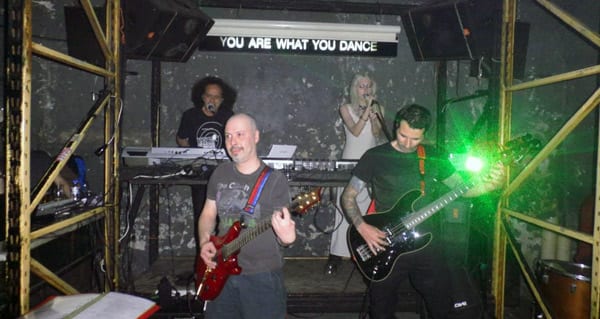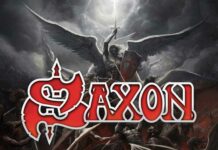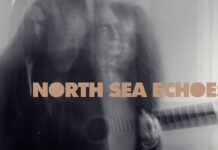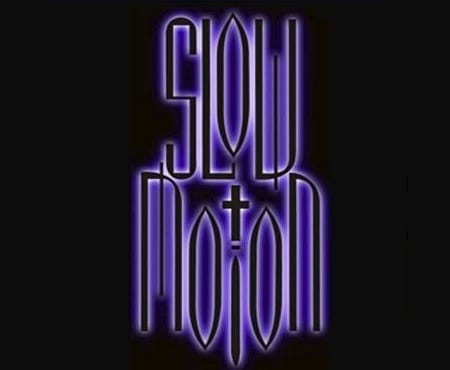
Very few of you would probably have heard of Slow Motion. Although they did not follow the path towards the commercial altar, the band is a true diamond of the more than withered Greek scene and made its appearance in the mid 80’s; a diamond that did not shine for a thousand plus-one reasons. In the editor’s humble opinion they are a band who were- and still are- way advanced their time. The big voice as well as the man, the keyboard of Slow Motion, Theodore Samoladas, guides us through the 30 year history of the band, speaks of the influences on his composing and at the same time, presents their future plans in his own special way, a beautiful individual for whom the word “creation” is rather prominent.
Interview (one of the best he has ever had): Dimitris Kazantzis
Rockpages.gr: I would like us to start with what Slow Motion have been working on, what are they concentrating on?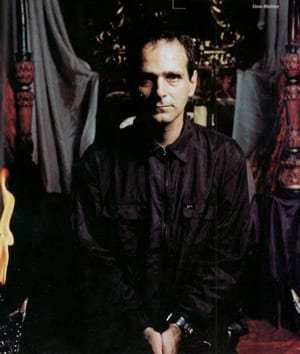
Theodor Samoladas: These days we are into something that has really caught our interest for the past few years, called 3D animation. We work on our songs by reforming them on various surfaces on the computer. We do not necessarily use specific shapes, but we are trying to create video clips which we use as projection background at the stages we play on. These may be flat surfaces, cubes, multiple points as we say in Topology, a field that I have been studying lately and I have been really intrigued by it as a concept because it deducts everything but shapes. Consequently, all this reinforces a better orchestration of our songs, a necessity which urged us to appoint a guitarist six months ago, as well a female singer who is also ….a computer wiz.
Rockpages.gr: There has been a widespread feeling among people lately that any band who belong to this specific music genre are sentenced to an underground scene activity. Do you agree on this?
Theodor Samoladas: It is not exactly a sentence, but an essential role control. I made a comment in a forum last year and said that mainstream is the worst enemy-I was severely criticized on that. Assessing the answers that were given under my comment made me think that they were right. Mainstream is not the enemy; there is no contradiction between pioneering and standard. Everything serves a purpose. We need the mainstream, we need the progressive, and we need the experimental because every single one defines the canvas on which certain elements of a band’s character and creator are arranged. So, in fact, yes we must always live as outsiders. Otherwise we would just lose our identity. However, we should not confront this as a sentence but as a destination.
Rockpages.gr: At this point, I would like us to give a brief resume of the band’s progress up to now and I will ask you under which circumstances the band was formed, in 1986 if I am correct. It was a unique period of time for bands of such nature as far as sound is concerned I think…
Theodor Samoladas: I am the composer, as well as the singer and keyboard player for Slow Motion. The nature of my job and my research, if I may say, on the keyboard, sounds and composition goes way beyond 1986, to my teenage years when enough material started piling up. I got to know to rest of the band members and some others before them. Finally, the current band happened to be able to support the whole thing and we took it from there. The composition remains one of my tasks and to a small degree, George, the drummer, may take on some of the work. Just like the way we emerged in 1986, the same people just carry on as the main core. Occasionally we may be embraced by other musicians who contribute with their knowledge, expertise and abilities, depending on the circumstances each time. In 1988 we created our first LP with the title “This” and in 1990 “Viaticum” was released. In the meantime we moved on to c.d. form with “Blind Transmissions” followed by “ An Exponential Symphony In An Entity That Wasn’t”. Each of these defined periods of certain method which we utilized on the songs, going through long periods of time without any live performances – we were not after the concerts, the bottom line was not the creation of songs based on the experiences of emotional situations; that’s what differentiated us in a way. We worked in a more structural way. We first arranged the composition, the orchestration and the lyrics came after and, finally, we enriched them emotionally with the most authentic, according to us, trends of ‘dark wave’ and ‘acid rock’ subculture. The compositions were there from the very start without being considered songs. This was the reason that urged us to create soundtracks for two short length films, one of which was given a music award. We also provided the music for several dance and theatrical performances all over Greece.
Rockpages.gr: What other Greek bands produced similar music sounds as yours back then?
Theodor Samoladas: Precisely….as you figure out, it is rather difficult to define this. I can say that the punk bands of the late 80’s got very close to the expression of the voice, the way of recitation of what we were trying to say through a music piece. We were close friends with “Anti”, Panx Romana, taking part in all the concerts of AETA where all the bands were gathered under the supervision of Iraklis and Asimos. We also met other groups such as “South Of No North” and “Split Image” who were also searching the same way as we did. Later on we came across some of the 90’s bands such as “Anvia”, “Kefaleo 24”, with whom we shared many common characteristics and worked together in concerts. More recently, around 2008-2009 we worked with “Tethrippon” , who were characterized as ethicists, maybe due to the situations we are experiencing nowadays. In essence, what they are also trying to achieve is the epic tone, the soundtrack tone behind a song; since we are not talking about songs anymore. We want to able to talk about forms we construct and we want them to maintain flawless and undamaged through space and time.
Rockpages.gr: The release of your promo cassette is followed by your very first studio album “This” in 1988. Would you care to tell me about the response of the audience after its release?
Theodor Samoladas: Those days, most bands started in the same way more or less. Since technology was not widely accessible to people due to the limited financial means as well as the cost of the studio sessions and the use of professional equipment, we started with a cassette which contained many of songs which were later found in “This”. The way they were recorded was rough, but the truth is that even to this day, listening to the way some songs of “This” on this cassette (especially “lles Ist Schon In Der Holle”) were made, gives a certain energy that cannot be produced in the sterile environment of professional digital recording. There was positive response because in those times there was a strong trend of fanzines, radio stations. The venues were not many, but they managed to gather the fans of the genre. You would organize a live you were sure to find all the Athens fans there. The venues that would ‘break’ the people had still not been launched. When a live took place everybody was there-before and after-, there were discussions, exchange of opinions, there was something to draw you there and you were able to transmit what you had ‘constructed”. We could say that today, thanks to the internet, things have evolved, but the transmission is made in a colder and more indirect way. Back then everything was direct.
Rockpages.gr: Two years after this, you release the truly amazing “Viaticum”, which I am lucky enough to have in my possession, once again by Wipe Out Records. Shall I assume that the recording company was very pleased with the first album?
Theodor Samoladas: When “This” was released, it did not receive the warmest of welcomes. It did not sell as much as Panx Romana and South Of No North’s work did. What was later on revealed though was that although other bands invested on a production that gave them spectacular acceptance and sales numbers, they soon died out like a fire that was lit with oil. Once the oil has run out, the fire is out. On the contrary, with Slow Motion there was a constant, slow and stable acceptance. Year after year through word of mouth and for a considerably hard-to-digest work, this acceptance was hutching throughout new circumstances and situations. As a result Slow Motion sell a small but stable number each year, something that continues up to now and I believe that it will carry on the same way. We have never had extraordinary results, but a stable trail which does not stop. Wipe Out was a bit skeptical at the beginning. The initial reviews for “This’ were not as positive. They were good in general but there was always a “but” and the question “what is this this now?” Out of the blue and after five-ten years the reviews began to take a different turn to the best. Therefore it is a little hard to say that something that Slow Motion made led them to success or failure. I am personally satisfied by this because we walk in a stable pace.
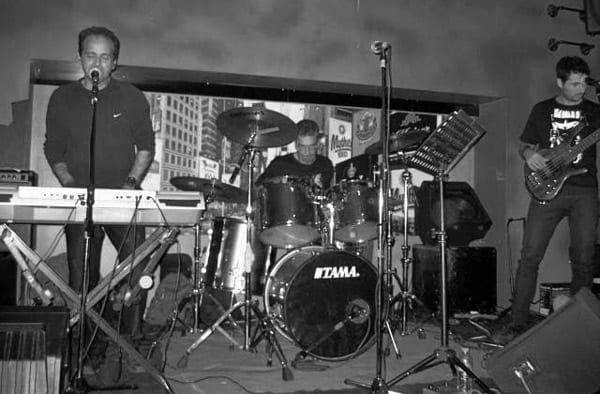
Rockpages.gr: In the record there was a booklet with equations and notations. It’s all about Newton’s theory, right?
Theodor Samoladas: yes indeed. There are Newton’s theories in there, as well as the relative theories on how universe is structured. I just wanted to show that for us, as I have previously mentioned, the creation of music, the creation of a song, does not depend as much on noting down emotional situations and their transmission through our communication through them. I wanted to make a point on the fact that we are just observers, personally I am involved with Astronomy and I happen to be the president of the Greek Astronomers’ Union, our drummer is a lecturer of Mathematics and Land Planning at the Polytechnic University, our bass player is a graphic designer and has studied for a considerable amount of time on his field- although he is currently designing signs and tattoos. We wanted to show that we work starting from the need to portray, reflect the universe in its most deductive form, to reconstruct it through our sound and then not to stop there as most experimentalists do; that is not to say that we made a structure and just present it to you so that you can translate it and color it as you may wish, but also insert the sentimental element in it. That’s what differentiates us and defines us as something particular and different to the way the ‘underground’ functions these days.
Rockpages.gr: What about the map at the bottom? Is it a map of a real location?
Theodor Samoladas: Apart from the structural element that I mentioned earlier, a real boost key to creating as Slow Motion relies upon the individual mystical doctrines, the Cosmo theories, the existential search problems, which are reflected on the lyrics to a great extent and through which, for me personally, is the concept of the rituals. Talking about rituals; it does not really matter what they refer to, what you believe in or not. It is just the key so that you put the things before you in an order and pay great attention to things that may not seem significant to others, but you can take a stone or a water vessel and say: “This is sacred”. I take a torch and I lit it during a concert and I say: “This is sacred”. That’s how I have been functioning in my own personal life. I used to be into sailing, exploring remote islands, gave them names and for some certain places which gave me strong energy I caught myself giving them names also, as well as saying that “This place is sacred”. Most times I used to go there either alone or at times with others and compose Slow Motion songs combining it with certain rituals. We are not talking about Black Magic of course. We would lit candles, put thoughts on paper during the night, see the colors and translate them into sounds, talk; these places are kept in our memories as places which inspired us into creating certain songs. Hence, I provided some maps which indicate these areas in “Viaticum”.
Rockpages.gr: How did the audience perceive “Viaticum”?
Theodor Samoladas: Once again, just like when “This” first came out, people were quite uncertain at the beginning. The people in Wipe Out were a little disappointed to begin with because they did not see the tension of “This”, this raw tension that they initially had liked. However, through time I met many people who noticed “Viaticum” first and I was given the chance through it to show that we are talking about raw expression, but an internal structure which defines creation behind everything. This slowly became evident to people who later came and approached us; I was delighted to hear people’s opinions about “Viaticum”, some of which identified with ritual procedures that led us into composing the music for this album.
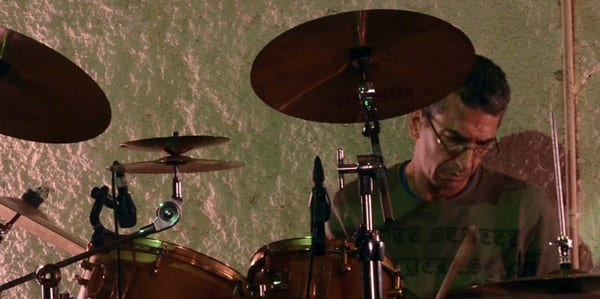
Rockpages.gr: How did the media deal with the band and this kind of scene in general?
Theodor Samoladas: Apprehensively. “It’s something we have never heard before”, but except this, there were some question marks on how responsible and mastered was something which is projected with such pomposity and audacity. It was all this tension and new, for those times, way of expression of an underground scene. It was a tension that dared to invoke classic forms, experimental forms, acid punk, gothic, dark wave….and some even said : “How do they put everything in, so raw, and give them to us?” There was an inhibition on their behalf to accept all these. As time goes by though, the perception has matured and the reviews and feedback are getting better and better. I remember one of the very first reviews, it was a negative review, but negative in a very right way. I can’t remember who actually wrote it, but it hit a very good point. “Slow Motion are a potential pop group, they function through the pop sub culture, but at the same time they are trying to diminish the value of the pop element, abrogate it and look down on it. There is a contradiction here, and I just can’t digest it.” This review jolted me back then, but there was some truth in it. I took it into consideration and I made some corrections to the next creations.
Rockpages.gr: “Blind Transmissions”, which is something like a collection, came out in 1998. Tell me a few words about it. Wasn’t it the following album for Slow Motion?
Theodor Samoladas: It is a completely new album, the first in CD form, which included pieces of work from 1991 up to 1997, a period when we had distanced ourselves from the stage. During this period, we only appeared in two concerts since we were absorbed into making music for the theatre and films. We were under the impression that the Greek scene had given us all it could and from that point we moved on in a more mature and soundtrack rhythm. I kept on writing lyrics and music in the same way and when Stefanos from CAPP approached us in 1998 and he listened to this material, he insisted it should be released, we finally gave in. Since it was not something that had been prepared for the creation of a new CD, but was just gathered within eight creative years- a piece per year approximately- for this reason we agreed to define it as a collection of that period.
Rockpages.gr: In the cd credits you mention the name of an excellent musician and current member of September Code, Theodore Mpotini. What was his contribution to the album?
Theodor Samoladas: He played the bass in some of our concerts, where there was a need for a second bass in some of our new songs as well as in some songs from “Viaticum”. Our acquaintance with him was very close, we had previously worked with him, did some rehearsals together, he would give us advice and took part in some lives we did in the 90’s and in some recordings for “Blind Transmissions”, but I can’t list him in our permanent associates. Our basic bass player has been, and will be, Giannis Varouksis. He may not possess Theodore Mpotini’s technique, but he has this trip and groove in his mind which is quite close to mine.
Rockpages.gr: Theodor, in general and beyond the things you have already told us, what is your source of inspiration as far as lyrics and music for Slow Motion are concerned?
Theodor Samoladas: Indirectly, I gave you an answer to this question earlier, but I will tell you what we used to listen to. I grew up – and don’t laugh- with Peter Hammill and Van Der Graaf Generator as well as the progressive rock of the 70’s. In the meantime, we moved on to the 4AD scene in the 80’s, took electro and techno of the 90’s, which then evolved into industrial, very seriously and nowadays I listen to experimentalists of the German scene and a little bit to the ones of Detroit. I do not long for the dancing and rhythmic element as much, but I am intrigued by the soundtrack concept. The school of Tresor from Berlin has been a big example of our influences, but the foundation was clearly the creation of what has always been there. I am of the opinion that when I create something, it preexists and I will just lit it from an angle which will reveal its hidden surfaces from within. Then, this will be emotionally enriched. Experimentalists do not often do this. It is something which is missing from the experimental and industrial scene. I will keep the emotional charge which, at times, becomes conjecture, begging, rituals and it comes to give a symbolic light and value to a crystal which has nothing to tell unless it is lit. This is the way that has always inspired us and makes us go on. I would like to highlight something at this point. We have never been the guys of the group, the band of the rehearsal, the guys of the clubs, the guys of the independent Greek rock scene. We are pretty much drawn into our own individual lives, I into astronomy, the other guy into maths…..we don’t hang out and we meet when something new has inspired us and we start building it. We don’t do clubs, we won’t easily go to parties. We may decide to go to a live that we really like all together, but we won’t take an active role in the current events and this is something that has its drawbacks too. We don’t have many connections and channels through which we can develop in the way others do. We do the things we do; we create the things we create. When we get the opportunity we share them, enhance them with audiovisual material and we leave them there. We have made this, we show you. Listen to it, color it, watch it, feel it and we keep going…
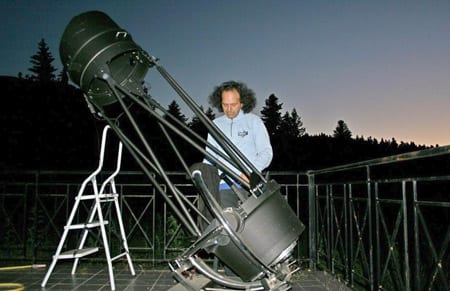 Rockpages.gr: What’s your verdict on the development of “dark” music the last thirty years?
Rockpages.gr: What’s your verdict on the development of “dark” music the last thirty years?
Theodor Samoladas: Although dark wave itself entails the expression which offers deeper feelings, it gives something deeper to the feeling; it possesses a childlike psychedelic element which stops at some point. I will mention some bands like Current 93 and Sopor Aeternus who express themselves in this raw manner that I like, using this hidden pagan ‘wannabe’ literature which takes you farther than the visible, which we like and have as inspiration. Yet, they don’t promote the structural concept. They are clearly based on the psychedelic. And when I speak of psychedelic, I do not mean the psychedelic of past years, illegal substances and other scenarios of the sort; I refer to the ‘playing’ of the senses. We just want to make the ‘playing’ of the senses absolute and base it on rules and shapes in a more raw and more deductive way.
Rockpages.gr: Have you considered re-releasing the first two albums of Slow Motion? I believe that people have a right to listen to them and the band is worth a second chance.
Theodor Samoladas: They were re-released by CAPP in 2002 if my memory serves me right. The masters were damaged during the attempt to transfer them to CD form, the bobbins had started to fray since the last time they experienced the reel of the tape recorder. There is no way of having them re-released. What can be done in the future is a better quality mastering using digital, unfortunately, means. It is something we have been discussing from time to time. Of course, if we are talking about reactivation of anything that has to do with production we definitely need a body who will contribute in the production. That’s where I think we are short-changed. As I mentioned before, we are not the kind of people who make twists and turns so as to find solutions. We have grown, each of us in their own bubble, and we perceive life and create in a mature way. We bring the songs before us, we fix them, we enhance them and we project them in our concerts. We hope we can be given the chance to get into the production process in the future.
Rockpages.gr: Would you like to share a very beautiful as well as a very ugly encounter which you came across through Slow Motion?
Theodor Samoladas: The most beautiful moment was at the theatre of Lycavitos, at the festival of AETA, 1ST September 1988. We were just about to come on stage when it started to rain. I started singing “Yochobine” from the album “This”. The couplet of the particular song includes a voice which goes four octaves high. Just when people started to flee, they were intrigued by this voice and came back towards the theatre to find out where this voice was coming from. Everybody stood up and was applauding for the whole duration of the song. I was so touched, that I was in tears. For the first time in my life I felt that there was a feedback and a justification for all the hard work. The worst moment was at a live at the School of Agriculture. The people were dancing on stage and our computer based equipment was drifted away and damaged. Somebody actually fell on the computers and many of our technical means were destroyed….we are talking about 1992 if I remember correctly.
Rockpages.gr: What are the plans for Slow Motion for the immediate future?
Theodor Samoladas: As I said, we are fascinated by the possibilities modern processors can offer for the creation of anything you can imagine in 3D on a computer. Imaginary worlds which reflect our internal or external world with new lengths of light wave. We work for many hours on new songs which are so many that cannot fit in a new production. We will present them on YouTube with well-polished videos- three of them are already ready. This work of audiovisual material has progressed enough and we will be ready to present some of the new ones which may be part of a DVD in the future. In the meantime….we keep our ears and eyes open so that we are aware of what’s happening around us, of the chances that may appear and may lead to a future production and diffusion.
Rockpages.gr: What is the biggest unfulfilled dream of Theodor Samoladas?
Theodor Samoladas: The first years, I have to admit, I went through the phase- which today I consider immature- of dreaming of a more successful path for the band as well as widespread productivity and acceptance by the external world. Later on I figured out that the moment you decide to function in a clearly deductive way and not be influenced by external situations, that’s what the price you need to pay is. The dreams, mine and the rest of the band’s, are more in the sphere of succeeding in a way to organize concerts in unique places. In a cave, on a mountain, on a remote island in the middle of the sea, places where we are not dealing with a one-way transmission of energy from the sender to the receiver, but with a holistic situation which will resemble rituals. We have some things in mind and we keep working on them. We have made some small connections and we may realize this pursuit of ours. But first, let us be well and be in good health…
